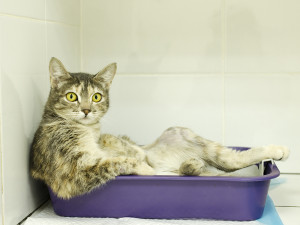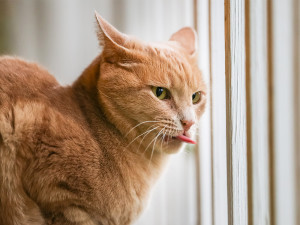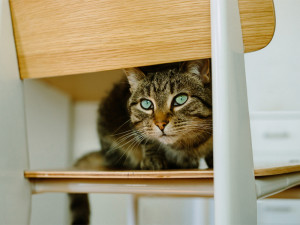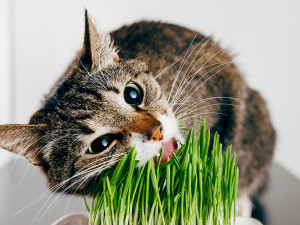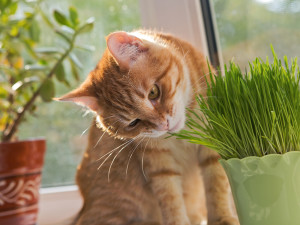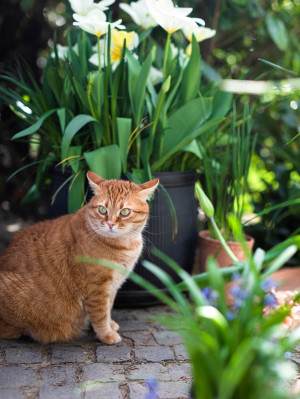Are Snake Plants Toxic to My Cat?
If you have a beloved snake plant, this answer will be a bummer.
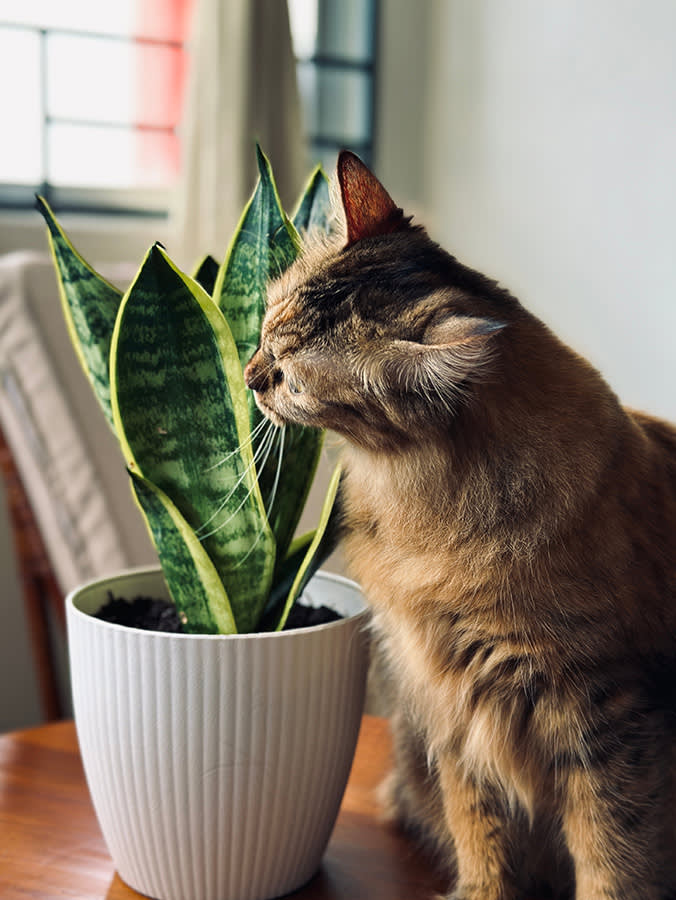
share article
Some cats love getting into all sorts of trouble. They climb and scratch things they shouldn’t, knock over fragile items, and take little nibbles out of books and plants. If your kitty is hell-bent on getting into your stuff, it’s best to make sure there is nothing dangerous around — including snake plants.
Why are snake plants dangerous to cats?
Snake plants (Dracaena trifasciata), also called “Mother-in-Law’s Tongue,” are popular plants because of their ability to thrive despite being cared for by even the most novice plant parent. Snake plants contain saponins, compounds that contribute to their hardiness. Saponins help protect snake plants from insects, fungi, and bacteria. But when ingested, saponins can cause gastrointestinal upset in cats.
Cholesterol is important for cell membrane stability throughout the body, including the intestines. When a cat ingests a plant with saponins, the saponins will bind to cholesterol, weakening intestinal cells. This can lead to water imbalance and result in diarrheaopens in a new tab. In severe cases, hemolysis (destruction of red blood cells) can occur.
What should I do if my cat has eaten a snake plant?
If you catch your cat in the act or find little nibble marks in your snake plant, watch closely for gastrointestinal signsopens in a new tab. The toxicity of snake plants is relatively low, so if your cat only took a tiny taste they may only experience a short bout of diarrhea with no other symptoms.
Have your cat seen by a veterinarian if they develop severe (or bloody) vomitingopens in a new tab or diarrhea, weakness, or lethargy. If your cat doesn’t have any symptoms but you’re worried about the amount of snake plant ingested, you can also contact an animal poison control center (ASPCA Animal Poison Controlopens in a new tab or Pet Poison Helplineopens in a new tab).
Diagnosing snake plant poisoning in cats
Vomiting and diarrhea are non-specific symptoms, meaning there are a myriad of possible causes. If your cat has access to a snake plant, or you find your snake plant disturbed, inform your veterinary staff so they can put it on the list of possible causes for your cat’s symptoms.
Symptoms of snake plant poisoning in cats
Snake plants are considered to be mild to moderately toxic to cats. Symptoms can range from oral irritation and nausea to severe vomiting and diarrhea. Symptoms of snake plant toxicity in cats include:
Droolingopens in a new tab/oral irritation
Nausea
Diarrhea
Dilated pupils
Treatment for snake plant poisoning in cats
Some cats can eat a small piece of snake plant without developing any issues. Cats that have symptoms after eating snake plant are treated symptomatically. This may include fluid therapy and medications for vomiting and diarrhea. If symptoms seem severe, bloodwork or other diagnostics may be recommended. Cats that develop profuse vomiting and/or diarrhea may require hospitalization.
How to prevent snake plant poisoning
The most effective way to prevent snake plant poisoning in cats is to make sure your cat does not have access to the plant. If there’s already a snake plant in your home, this may be easier said than done. Some curious cats will easily conquer any obstacles put in their way. If this is the case with your cat, find a new home for your snake plant and get a cat-safe replacement.
Are all parts of snake plants poisonous to cats?
All plants of a snake plant are toxic to cats. Saponins, the toxic component, are most concentrated in the leaves.
How do I stop my cat from eating snake plants?
The best way to stop your cat from eating a snake plant is to keep snake plants out of your cat’s environment. Some cats can be trainedopens in a new tab to stay away from certain items. The saponins in snake plants tend to make them bitter and would hopefully prevent your cat from eating too much (or any) plant material. But cats are weirdos, so don’t depend on the bitterness to keep them away. Just get rid of the plant.
The bottom line: Are snake plants poisonous to my cat?
Snake plants are poisonous to cats, so when choosing houseplants, cat parents should opt for cat-safe options. There are plenty of online resources like ASPCA Animal Poison Control’s toxic and non-toxic plant list to help you make the right choice.
Other plants that are safe for cats
Rattlesnake plantopens in a new tab (Goeppertia insignis): This tropical plant is both cat-safe and gives the same lush look as snake plants.
Blushing bromeliad (Neoregelia carolinae): These plants have scarlet blooms and are perfect for adding a pop of color to your home.
African violet (Saintpaulia ionantha): African violets produce vibrant violet flowers that are safe for cats if they happen to nibble on them.
Other plants that are dangerous for cats
Easter lilyopens in a new tab (Lilium wallichianum): True lilies (including tiger lily, Daylily, star lily, Japanese show lily, and others) are extremely toxic to cats. Cats that eat lilies are at risk of developing gastrointestinal signs within three hours of ingestion and acute kidney failure within three days. In some cases, lily ingestion can be fatal to cats.
Oleander (Nerium oleander): All parts of oleander plants are toxic to cats. Oleanders contain cardiac glycosides, which are compounds that can cause vomiting, electrolyte imbalances, cardiac arrhythmias, tremors, seizures, and death.
Poinsettiasopens in a new tab (Euphorbia pulcherrima): Poinsettias are ubiquitous during the winter holiday season, but they should be kept away from your cat. These plants contain irritating sap that can cause drooling, vomiting, and diarrhea when ingested. Though uncommon, it can also cause irritation when it makes contact with skin and eyes.
FAQs (People also ask):
What happens if a cat eats a snake plant?
Snake plants can cause gastrointestinal upset if ingested by a cat. Cats that eat snake plants are at risk of developing symptoms like nausea, anorexia, diarrhea, and/or vomiting.
Can cats eat snake plants safely?
Cats cannot eat snake plants safely. Snake plants are mildly to moderately toxic to cats and the entire snake plant is toxic. Saponin, a toxic compound, is most concentrated in the leaves, which are the easiest part of the plant for a cat to ingest.
Are snake plants poisonous to cats if they smell them?
Cats should not develop any signs of toxicity if they simply smell a snake plant. However, allowing your cat to have enough access to smell a snake plant should be discouraged because it means they also have enough access to eat it.
Resources

Dr. Alycia Washington, DVM, MS
Alycia Washington, DVM, is a small animal emergency veterinarian based in North Carolina. She works as a relief veterinarianopens in a new tab and provides services to numerous emergency and specialty hospitals. Dr. Washington is also a children’s book author and freelance writer with a focus on veterinary medicine. She has a special fondness for turtles, honey bees, and penguins — none of which she treats. In her free time, Dr. Washington enjoys travel, good food, and good enough coffee.
Related articles
![Cat eating out of metal bowl]() opens in a new tab
opens in a new tabTop 10 Foods That Are Toxic to Cats
Sharing isn’t always caring. Keep your cat safe by keeping these human snack staples to yourself.
![Cat chewing on cat grass]() opens in a new tab
opens in a new tabThe 10 Best Non-Toxic House Plants for Cats
Cats love the crunch of a houseplant. These will do them no harm.
![A dog laying under a table outside while a woman cares for her plants.]() opens in a new tab
opens in a new tabFollow These 4 Pet-Safe Pest Control Tips for Your Summer Garden
You need to be extra careful if your dog or cat is your gardening assistant.
![Cat sitting on a window sill eating cat grass]() opens in a new tab
opens in a new tabSweet Greens: The Best Cat Grass Grow Kits
Not to be confused with catnip (or other buds).
![Ginger adult cat sits in flowering summer garden on pavement.]() opens in a new tab
opens in a new tabWhat to Do If Your Cat Gets Stung By a Bee
It’s not always as simple as removing the stinger. Find out everything you need to know.
